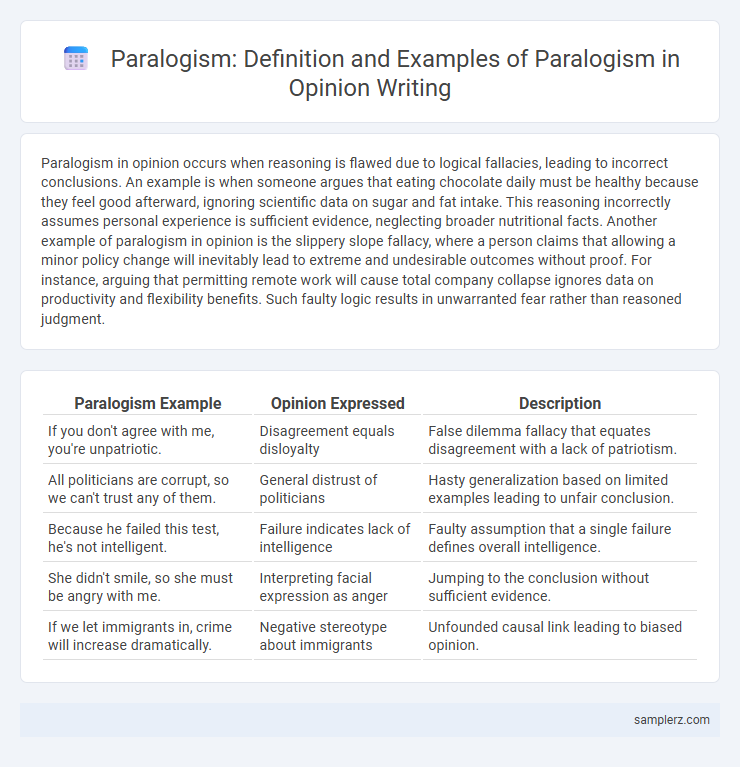Paralogism in opinion occurs when reasoning is flawed due to logical fallacies, leading to incorrect conclusions. An example is when someone argues that eating chocolate daily must be healthy because they feel good afterward, ignoring scientific data on sugar and fat intake. This reasoning incorrectly assumes personal experience is sufficient evidence, neglecting broader nutritional facts. Another example of paralogism in opinion is the slippery slope fallacy, where a person claims that allowing a minor policy change will inevitably lead to extreme and undesirable outcomes without proof. For instance, arguing that permitting remote work will cause total company collapse ignores data on productivity and flexibility benefits. Such faulty logic results in unwarranted fear rather than reasoned judgment.
Table of Comparison
| Paralogism Example | Opinion Expressed | Description |
|---|---|---|
| If you don't agree with me, you're unpatriotic. | Disagreement equals disloyalty | False dilemma fallacy that equates disagreement with a lack of patriotism. |
| All politicians are corrupt, so we can't trust any of them. | General distrust of politicians | Hasty generalization based on limited examples leading to unfair conclusion. |
| Because he failed this test, he's not intelligent. | Failure indicates lack of intelligence | Faulty assumption that a single failure defines overall intelligence. |
| She didn't smile, so she must be angry with me. | Interpreting facial expression as anger | Jumping to the conclusion without sufficient evidence. |
| If we let immigrants in, crime will increase dramatically. | Negative stereotype about immigrants | Unfounded causal link leading to biased opinion. |
Common Paralogisms in Everyday Opinions
Common paralogisms in everyday opinions often arise from faulty cause-and-effect assumptions, such as believing that a single negative experience defines an entire group or situation. Another frequent example is the false dilemma, where people present only two options as if they are the sole possibilities, ignoring the complexity of real issues. These logical errors distort reasoning, leading to biased and oversimplified judgments in daily conversations.
How Paralogism Skews Personal Judgments
Paralogism distorts personal judgments by leading individuals to draw conclusions based on faulty reasoning rather than factual evidence, often resulting in biased or illogical opinions. This flawed thinking process can reinforce cognitive biases such as confirmation bias, where people selectively interpret information to fit preconceived beliefs. Understanding paralogism helps in recognizing and correcting errors in subjective evaluations, promoting more rational and objective opinion formation.
Paralogism Examples in Political Opinions
Paralogisms in political opinions often arise from flawed reasoning, such as assuming a policy must be bad solely because it was proposed by an opposing party, exemplifying a false dilemma. Another common example is the slippery slope fallacy, where critics argue that implementing a minor reform will inevitably lead to extreme and undesirable outcomes without evidence. These paralogisms distort logical debate and hinder constructive discourse in political analysis.
Spotting Paralogisms in Social Media Debates
Spotting paralogisms in social media debates involves identifying flawed reasoning where conclusions do not logically follow from premises, often seen in emotionally charged exchanges. An example includes assuming a controversial statement is false simply because the speaker is disliked, known as the ad hominem fallacy. Recognizing these common logical errors helps maintain clarity and constructive dialogue in online opinion discussions.
Paralogistic Thinking: Case Studies in Public Opinion
Paralogistic thinking in public opinion often manifests through flawed reasoning patterns leading to skewed conclusions despite seemingly logical premises. Case studies reveal how cognitive biases and emotional influences drive individuals to adopt paradoxical beliefs or unsupported assumptions, exemplifying paralogisms. These errors highlight the complexity of opinion formation and the challenges in achieving rational consensus in public discourse.
The Role of False Logic in Forming Opinions
Paralogism plays a crucial role in shaping opinions by using flawed reasoning that appears logical but lacks validity, leading to misconceived beliefs. For example, the false assumption that correlation implies causation can cement biased opinions without factual support. This misuse of logic fosters misconceptions and hinders critical thinking in public discourse.
Opinion Pieces: Paralogism Versus Persuasion
Opinion pieces often reveal paralogism when flawed logic masquerades as persuasive argument, misleading readers by presenting invalid conclusions as valid. This confusion undermines genuine persuasion, which relies on coherent reasoning and credible evidence to support opinions. Recognizing paralogism in editorials helps readers critically assess the reliability of expressed viewpoints and discern authentic argumentative techniques.
How Paralogism Influences Groupthink
Paralogism, or flawed reasoning that appears logical, significantly influences groupthink by reinforcing unanimous but inaccurate opinions within groups. When members accept paralogistic arguments, critical analysis diminishes, leading to conformity and suppression of dissenting views. This dynamic exacerbates cognitive biases and hampers effective decision-making.
Identifying Paralogisms in Editorial Arguments
Editorial arguments often contain paralogisms, logical fallacies where conclusions do not logically follow from premises, such as false cause or hasty generalization. Identifying paralogisms requires careful analysis of the reasoning structure, focusing on inconsistencies or irrelevant evidence used to support claims. Recognizing these errors enhances critical reading and promotes more informed public discourse.
Red Flags: Paralogism Traps in Opinion Writing
Paralogism in opinion writing often manifests through red flags such as false dichotomies, where complex issues are reduced to only two opposing options, misleading readers. Circular reasoning traps expressions in a loop, using conclusions as premises without providing new evidence. Recognizing these logical missteps is essential to maintain credibility and avoid undermining persuasive arguments.

example of paralogism in opinion Infographic
 samplerz.com
samplerz.com